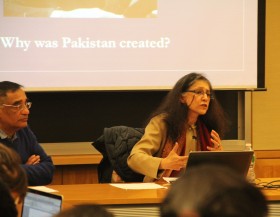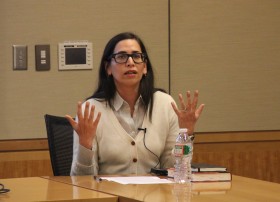By Mehjabeen Zameer, Ed.M Candidate, International Education Policy, Harvard Graduate School of Education; SAI Student Coordinator
On Wednesday, December 3, renowned Pakistani historian Professor Ayesha Jalal of Tufts University, spoke about her new book The Struggle for Pakistan at a SAI Book Talk. Jalal highlighted the need for a comprehensive historical interpretation of Pakistan’s narrative and encouraged members of the audience to view the history of the country through a geopolitical lens rather than a religious one.
The event was moderated by Professor Ali Asani, Professor of Indo-Muslim and Islamic Religion and Cultures at the Graduate School of Arts and Sciences. Atiya Khan, South Asia Institute Aman Fellow, also participated as a discussant.
Professor Jalal started off her talk by briefly touching upon the creation of Pakistan and argued that the theory of it being created was fallacious. The young state faced many problems, including the passing away of its founder, Muhammad Ali Jinnah, and shortly after the assassination of its premier, Liaquat Ali Khan, which made the situation worse. In 1951, due to the Cold War and the regional dispute with India over Kashmir gaining eminence, the Pakistani military started coming to power.
After this brief overview of the circumstances leading to the creation of Pakistan and leading to the rise of a powerful military, Professor Jalal then went on to interpret the 1971 separation of East Pakistan. She made the case that the context in 1971 was a mirror image of that in 1947, as it was all about power sharing.
Zulfiqar Ali Bhutto, then premier of Pakistan, declared Bengali demands to be legitimate, and conversely, the Bengalis, while intending to claim their power, did not want to quit Pakistan. However, during negotiations between the two parties, the Pakistani army intervened and in the war that followed, committed many atrocities.
Following the separation of East Pakistan, Professor Jalal credited Zulfiqar Ali Bhutto for being the architect of many key elements of Pakistan’s foreign policy. Not only did he endorse relations with China, he was also the father of Pakistan’s nuclear programme. However, the programme needed money and so Bhutto turned to the Arab petro-dollars. This move was capitalized on by the religious parties, who pushed Bhutto to declare Ahmadis as non-Muslims.Professor Jalal then highlighted the transformation of Pakistan under the Zia regime, where it went from a moderate state to becoming a hot bed of nefarious religious thinking. She argued that the Soviet war in Afghanistan was the start of anti-Americanism in Pakistan and for the Pakistani military, served as a cash cow. The regime also resulted in Islamization which decreased Zia’s popularity and was ferociously opposed by many including women’s rights groups and other famous poets such as Habib Jalib.
Lastly, Professor Jalal commented on the current political dynamics in Pakistan, by stating that the elections of 2013 were an important hallmark in the country as not only did they mark the first democratic transition, but they also were a warning from people to all political parties that if they did not deliver, they would be voted out. Highlighting the largest voter turnout in the country ever in the face of Talibanization, Professor Jalal credited the people of Pakistan for having extraordinary resilience.
To conclude, Professor Jalal stated that if Pakistan had recognized regional demands, it would have been more successful in curbing militancy. She further pointed out the decline in military prestige due to ground lost to militants and suggested that it would take years of unbroken democratic processes to fix the system.
The book talk was followed with questions by Atiya Khan, which proved to be even more enlightening for participants and sparked discussions about the future of Pakistan.
Tweets from the event:
Democracy is conflict. A civilized society manages that conflict. #AyeshaJala @HarvardSAI #Pakistan
— Mariam Chughtai (@MariamChughtai) December 3, 2014
Secularism is not opposed to religion. #AyeshaJalal @HarvardSAI
— Mariam Chughtai (@MariamChughtai) December 3, 2014
Somebody needs to go tell Pakistan they are not a failed state. People don’t take responsibility for their fate! #AyeshaJalal @HarvardSAI
— Mariam Chughtai (@MariamChughtai) December 3, 2014



